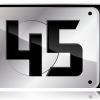For Discussion: Tackling the Pain of Video Production Storage
-
Topics
-
Sychicyuto ·
Posted in Troubleshooting0 -
3
-
0
-
Fluffy411 ·
Posted in Troubleshooting0 -
SumanRao ·
Posted in New Builds and Planning1 -
1
-
5
-
ShadowWSK ·
Posted in Troubleshooting1 -
0
-
mrgerry123 ·
Posted in Servers, NAS, and Home Lab1
-
-
play_circle_filled

Latest From Linus Tech Tips:
The BRIGHTEST Monitor We've EVER Seen - Sun Vision rE rLCD Display
-
play_circle_filled

Latest From ShortCircuit:
The World's Fastest CPU (Technically...) - Intel i9-14900KS





.thumb.jpg.ab6821c090888206ddcf98bb04736c47.jpg)









Create an account or sign in to comment
You need to be a member in order to leave a comment
Create an account
Sign up for a new account in our community. It's easy!
Register a new accountSign in
Already have an account? Sign in here.
Sign In Now